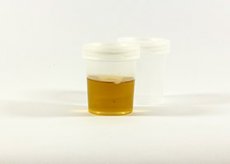Medical expert of the article
New publications
General urinalysis in pregnancy
Last reviewed: 04.07.2025

All iLive content is medically reviewed or fact checked to ensure as much factual accuracy as possible.
We have strict sourcing guidelines and only link to reputable media sites, academic research institutions and, whenever possible, medically peer reviewed studies. Note that the numbers in parentheses ([1], [2], etc.) are clickable links to these studies.
If you feel that any of our content is inaccurate, out-of-date, or otherwise questionable, please select it and press Ctrl + Enter.

A general urine test during pregnancy is a mandatory test and is taken before each visit to the doctor supervising the pregnancy.
With the help of general urine analysis data, you can find out about deviations in the body at an early stage. Excessive acetone levels will indicate liver pathologies, toxicosis. The presence of sugar in the urine indicates the development of diabetes, and protein fractions in the urine are the first sign of toxicosis.
Standards for general urine analysis:
- The volume of the morning portion of excreted urine is 150-250 ml.
- Urine color can range from light yellow to deep yellow (some foods and medications can affect its color).
- Normal urine should be completely transparent; urine becomes cloudy during any inflammation, when protein fractions appear in it.
- The normal urine density is 1010-1030 g/l. This value may increase in kidney diseases (glomerulonephritis, diabetes mellitus), and decrease in chronic renal failure.
- Urine acidity can be alkaline (if eating mostly plant foods) or acidic, the normal pH is 5-7. If the pregnant woman is not a vegetarian, the alkaline reaction of urine can be caused by a chronic inflammatory process in the genitourinary system. In diabetes mellitus and fever, urine pH shifts to the acidic side.
- The normal leukocyte count should be no less than 5 units.
- There should not be any red blood cells normally; the presence of 3 units in the field of view is acceptable.
- Bacteria and protein should not normally be present in a urine sample, and their presence indicates bacterial inflammation.
- Also, the urine should not contain bilirubin, ketone bodies, glucose, or helium casts (no more than 1-2 in the field of vision).
Who to contact?
Nechiporenko analysis during pregnancy
Nechiporenko analysis during pregnancy allows you to get information about the state of the woman's genitourinary system and at an early stage to identify probable diseases characteristic of this condition - pyelonephritis, cystitis. During pregnancy, the load on the kidneys and excretory system is especially high, so it is very important to monitor its work, especially if you are bothered by painful sensations in the sacrum, in the lumbar region, there are urges to urinate frequently.
Before collecting urine for analysis, you need to wash the perineum and collect the middle portion of urine in a special bottle, which can be purchased at a pharmacy. Immediately after collecting the material, you need to send the urine sample to the laboratory.
Using the Nechiporenko analysis, it is possible to determine the content of formed elements in urine. An increase in the normal content of leukocytes indicates inflammation (probability of cystitis, pyelonephritis), an increase in the normal content of erythrocytes indicates kidney stones, tumors, the appearance of healin cylinders in urine indicates glomerulonephritis, poisoning.
It is necessary to take the Nechiporenko urine test during pregnancy - with its help, you can identify kidney pathologies, late toxicosis at an early stage, carry out the necessary treatment and protect yourself and the unborn baby from complications.
Urine analysis acetone during pregnancy
Urine analysis of acetone during pregnancy is carried out for the purpose of more detailed diagnostics of possible internal diseases. With an increase in the level of acetone in the urine, the pregnant woman becomes lethargic, sleepy, loses appetite, the body temperature rises, and there is a strong thirst. During pregnancy, such a condition, like any other ailment, is unacceptable. Acetone appears with a lack of iron, severe diseases of the digestive system. A similar ailment is observed in those who have been on a diet for a long time and limited carbohydrates. If acetone appears in the urine of the expectant mother, then this is very dangerous for the fetus.
Reasons for the appearance of acetone in urine:
- Wrong diet, with a predominance of sweets.
- Stressful situations.
- Malaise due to severe early toxicosis.
Serious therapy is not required to alleviate the woman's condition; a well-designed diet and periodic urine testing for acetone are sufficient. Taking the test is not difficult; the rules for preparing and delivering the material are the same as for a general test. The main thing is not to forget about personal hygiene before collecting a urine sample for testing.


 [
[